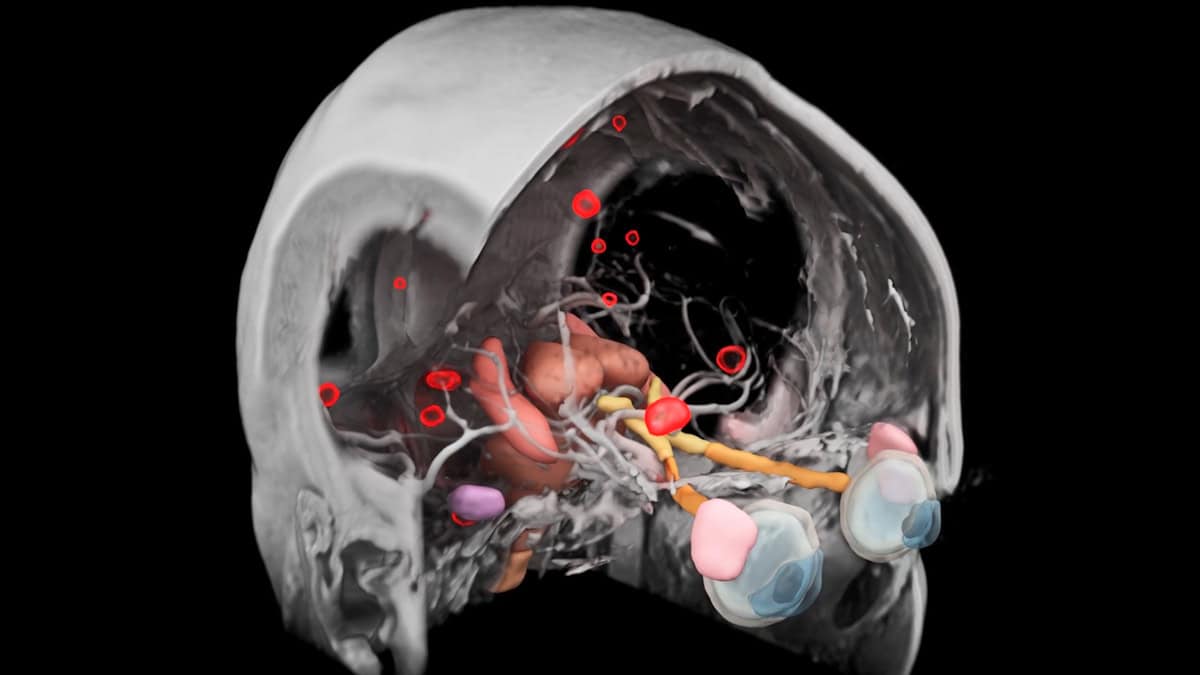Science
AI Software Transforms Contouring Process for Brain Metastases

The integration of AI-powered algorithms in medical imaging is revolutionizing the treatment of brain metastases, cancerous lesions that spread from other parts of the body. A new software developed by Siemens Healthineers automates the contouring of these lesions, significantly enhancing the accuracy and efficiency of the process. This advancement is particularly important as stereotactic radiotherapy (SRS) gains popularity for its precision in targeting individual lesions with high doses of radiation.
SRS treatment is preferred over whole-brain irradiation due to its potential for higher local control rates and cognitive sparing, along with a shorter treatment duration. However, the initial step of accurately identifying and delineating multiple brain metastases on MRI scans can be complex and time-consuming. Evrim Tezcanli, a professor of radiation oncology at Acibadem Atasehir Hospital in Turkey, highlights two significant challenges: detecting small lesions, particularly those under 0.1 cc, and accurately contouring larger metastases without affecting surrounding healthy brain tissue.
To tackle these challenges, the AI software is integrated into Siemens’ syngo.via RT Image Suite and AI-Rad Companion Organs RT packages. The software utilizes advanced deep-learning algorithms to quickly analyze patient MRI images, contour metastatic lesions, and delineate nearby organs at risk, such as the brainstem and optical structures. Tezcanli notes that the software effectively reduces manual workloads, allowing medical professionals to focus more on patient care.
In a study assessing the software’s accuracy and time efficiency, Tezcanli and her team compared AI-generated contours with those produced by two experienced radiation oncologists. The research involved ten patients, each with three to 17 brain metastases, and encompassed a total of 82 lesions. The oncologists manually contoured the lesions based on contrast-enhanced MRI scans, while the AI software processed the same images for automated contouring.
The results were impressive. Tezcanli reported strong agreement between the manual and AI-generated contours, especially for lesions larger than 0.1 cc. The median Dice similarity coefficient was 0.83, increasing to 0.91 when excluding smaller lesions. Additionally, the median Hausdorff distance—a measure of geometric similarity—was only 0.3 mm, indicating that the AI-generated boundaries were clinically acceptable.
The study also quantified the time efficiency of the AI tool compared to manual contouring. The software completed contouring for each patient in one to two minutes, reducing the workload by an average of 75%. In some cases, the AI saved over 30 minutes per patient. While expert review of AI contours remains essential, the correction time was remarkably short, averaging only three to four minutes for review.
The research utilized high-resolution imaging techniques, including post-contrast T1 MPRAGE sequences from a 3 Tesla MRI scanner. This precision is crucial for effective treatment. The software demonstrated a sensitivity of 94% in detecting lesions, successfully identifying 77 out of 82 metastases, while also discovering three additional lesions not initially detected by the oncologists. The false positive rate was 8.5%, with some vascular structures mistakenly identified as metastases.
The contouring data generated by the AI software is exported in DICOM RT Struct format, facilitating seamless integration into the treatment planning system. At Acibadem Atasehir Hospital, this process is streamlined using HyperArc, a specialized software module that automates treatment planning and delivery for SRS. HyperArc has proven to be effective even for patients with multiple brain metastases, allowing for rapid and efficient treatment planning while preserving plan quality.
Tezcanli emphasizes the benefits of this technological integration, stating that it enables same-day workflow where contouring, planning, and treatment can occur within the same day. This rapid response is critical for patients undergoing radiation therapy, particularly when they are also receiving systemic therapies that must be administered on schedule.
Looking forward, Tezcanli believes the use of AI in treating brain metastases will become increasingly important. As patients live longer with cancer, the likelihood of developing metastases rises, and enhanced imaging techniques lead to more identified lesions. She anticipates that AI will play a significant role in improving treatment efficiency and accuracy.
Following the positive evaluation of the AI software, Tezcanli and her team are eager to incorporate it into their clinical routine, confident that its capabilities will enhance patient outcomes. “AI will definitely have a place because of the time savings and accuracy it delivers,” she states. As the field of oncology continues to evolve, advancements like these promise to transform patient care and treatment methodologies.
-

 Entertainment3 months ago
Entertainment3 months agoAnn Ming Reflects on ITV’s ‘I Fought the Law’ Drama
-

 Entertainment4 months ago
Entertainment4 months agoKate Garraway Sells £2 Million Home Amid Financial Struggles
-

 Health3 months ago
Health3 months agoKatie Price Faces New Health Concerns After Cancer Symptoms Resurface
-

 Entertainment3 months ago
Entertainment3 months agoCoronation Street’s Carl Webster Faces Trouble with New Affairs
-

 Entertainment3 months ago
Entertainment3 months agoWhere is Tinder Swindler Simon Leviev? Latest Updates Revealed
-

 Entertainment4 months ago
Entertainment4 months agoMarkiplier Addresses AI Controversy During Livestream Response
-

 Science1 month ago
Science1 month agoBrian Cox Addresses Claims of Alien Probe in 3I/ATLAS Discovery
-

 World2 weeks ago
World2 weeks agoBailey Announces Heartbreaking Split from Rebecca After Reunion
-

 Health4 months ago
Health4 months agoCarol Vorderman Reflects on Health Scare and Family Support
-

 Entertainment4 months ago
Entertainment4 months agoKim Cattrall Posts Cryptic Message After HBO’s Sequel Cancellation
-

 Entertainment3 months ago
Entertainment3 months agoOlivia Attwood Opens Up About Fallout with Former Best Friend
-

 Entertainment2 weeks ago
Entertainment2 weeks agoCoronation Street Fans React as Todd Faces Heartbreaking Choice





















